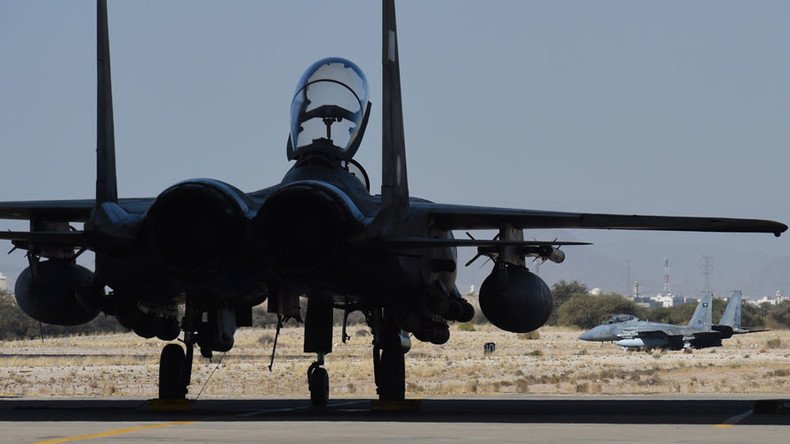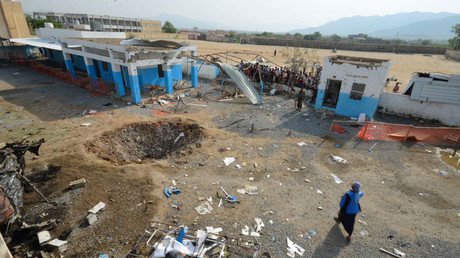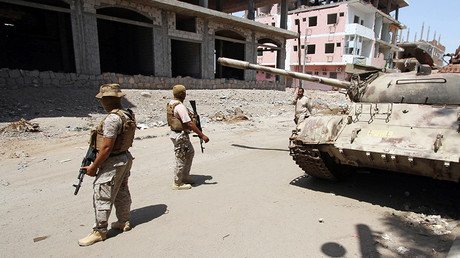‘US merchants of death continue arming repressive regimes’

The US is the largest seller of weapons, supplying customers like Saudi Arabia, Israel, Egypt - the very countries that have some of the most serious violations of human rights in the world, Sara Flounders, head of the International Action Center, told RT.
The US Senate is due to vote on a resolution to block the sale of tanks and other military equipment to Saudi Arabia worth more than a billion dollars.
Just a few days before the vote the chief of the Pentagon agency that administers foreign arms sales was spotted at a get together of weapons industry executives and lobbyists.
Riyadh has requested new weapons to modernize its arsenal and replace battlefield losses. It took delivery of weapons worth $20 billion dollars last year.
Despite a public outcry the Obama administration has been successful in sealing lucrative arms deals with the Gulf monarchy.
RT: The Senate may vote as early as tomorrow on a resolution blocking the latest arms sale to Saudi Arabia. What do you expect from the vote?
Sara Flounders: I expect once again the US is only all the more anxious to sell weapons to one of the greatest violators of human rights in the world. The US is today the largest seller of weapons. It is the largest merchant of death in the world today by far. And who are its biggest customers? Saudi Arabia, Israel, Egypt - the very countries that have some of the most serious violations of rights. And there is a conscious disconnect and a determination to support repressive regimes that are absolutely callous toward the human rights of their own population. So, I expect once again the Senate will pass, because every one of those senators voting for it, just like every one of those generals knows that there are huge multi-million dollar deals upon their retirement and speakers fees and joining the board of directors of the very military corporations that they are today voting these deals for.
RT: Do you think parties like this really have an effect on the decision-making process on Capitol Hill?
SF: There has been an important campaign to bar US weapon sales to Saudi Arabia. However, as there are multi-billion dollars at stake, huge profits at stake, that becomes decisive. These weapon deals go through time after time, year after year and they really are in the tens of billions of dollars. And it is because the US military corporations, the big industries have such a stake in the profit of these arms deals. They don’t allow any real discussion of human rights, of what these weapons will be used for, whether it is war on Yemen, war on Syria or repression of the Saudi people.
RT: Why do the US and UK continue to supply Saudi Arabia with arms despite repeated calls from human rights organizations to ban arms sales over collected evidence that they are used in attacks on civilian targets?
SF: The campaigns to ban these weapon sales to Saudi Arabia and to bring to the light of day the horrendous human rights record of Saudi Arabia are very important campaigns. And it is important to fight this publicly. At the same time they go through time after time because of the very senators passing it and military industries pushing it make such enormous profits. And as I say, the senators who vote for this know very well that they will be well-rewarded in speaker’s fees and donations to their campaigns and on their retirement they will be asked to join the boards of the corporations that they are now voting for. So, this is a cynical deal… They are selling weapons that they know will be used for repression, for war, for the funding of ISIS and terrorist organizations.
RT: What should be done to pressure them more effectively into stopping supplying Saudi Arabia with arms?
SF: I think this campaign will definitely continue exposing really the relationship between the banks, the military industries and complete military dictatorship that the Saudi royal family represents today. Saudi Arabia couldn’t survive one day without the US military, political and diplomatic support. Nor could Israel. Nor could Egypt for that matter…
The statements, views and opinions expressed in this column are solely those of the author and do not necessarily represent those of RT.














